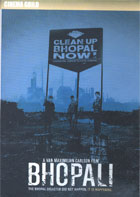
Bhopali 2011
Distributed by Cinema Guild, 115 West 30th Street, Suite 800, New York, NY 10001; 212-685-6242
Produced by Kirk Palayan
Directed by Van Maximilian Carlson
DVD, color, 80 min.
Sr. High – General Adult
Asian Studies, Environmental Studies
Date Entered: 11/28/2011
Reviewed by Cliff Glaviano, formerly with Bowling Green State University Libraries, Bowling Green, OHThis film is based on the 25th anniversary of the environmental disaster, December 3, 1984, that killed more than 20,000 people in Bhopal, India. Through a series of management decisions intended to increase corporate profits, Union Carbide (now owned by Dow Chemical) abandoned measures intended to insure the safe processing of the experimental pesticide methyl isocyanate (MIC) resulting in the release of about 40 tons of lethal gas the evening of December 2nd. Those unable to run out of the killing zone died immediately or within a few days. Additional hundreds of thousands, those not immediately killed in the disaster and unable to relocate away from the immediate area of the plant suffer mental problems, while many of their children, the second and third generation from the leak, suffer birth defects, deformities, cerebral palsy or mental retardation. All are at increasing risk from cancer as they must drink groundwater polluted by chemicals leaching from the closed, but never detoxified chemical plant.
Filmmaker Carlson allows the victims to tell their stories, supplemented by interviews with activists, local politicians and former chemical workers. It’s not a surprise that the victims view Union Carbide and its past CEO, Warren Anderson, responsible. Anderson jumped bail and returned to the U.S. in 1985. India settled with Union Carbide for $470 M. Nobody seems to be responsible for cleaning up the plant or enforcing the Indian Supreme Court’s order for clean water for Bhopal (2004). The final irony in this horror tale is the inclusion of a Dow Chemical promotional ad emphasizing its concern for the “human element” in the chemical business. These are the same folks that refused to respond to Carlson’s multiple interview requests.
Viewers are cautioned that the graphic nature of birth deformities, the tragic mental state of some children and the nature of rehabilitation and speech therapies shown in the film can be quite disturbing. Nonetheless, Bhopali is highly recommended to those interested in the environment, South Asia, and corporate responsibility.
Awards
- Grand Jury Best Documentary Award, Slamdance Film Festival, 2011
- Documentary Audience Award, Slamdance Film Festival, 2011
- Best Documentary Award, New York Indian Film Festival, 2011
- Best Documentary Award, Los Angeles International Film Festival, 2011
- Best Documentary Special Jury Award, Beverly Hills Film Festival, 2011